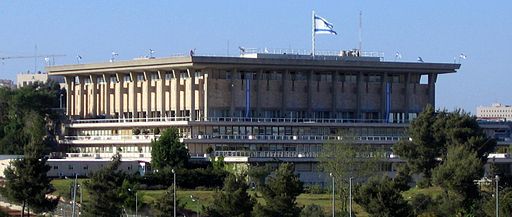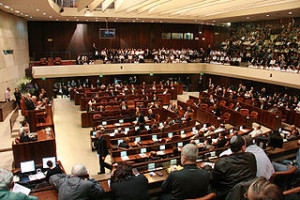Guest Columns
Multi-district elections: fact and fiction

Many Israelis, including academics with a degree in political science, believe that such is the smallness of their country, both in population and area, that multi-district or constituency elections are inappropriate. They are wedded to the existing parliamentary system whereby the entire country constitutes a single electoral district in which parties compete and win Knesset seats on the basis of Proportional Representation (PR). This, they believe, enables distinct groups, whether ideological, ethnic, religious, or otherwise, to be represented by distinct parties in the Knesset regardless of whether the individuals composing these groups are dispersed throughout the country.
They contend, moreover, that representation of geographical districts leads to disproportionate representation of diverse groups as well as gerrymandering. Let us distinguish facts from fictions.
Experience with multi-district elections
First, it is not irrelevant to mention the fact that in 1997, I surveyed 76 countries having democratic elections for their lower (or only) branch of the legislature, and of these, 74 had multi-district elections; and many of these countries, we shall see, are smaller than Israel. If we ignore the Netherlands, a homogeneous constitutional monarchy, it may then be said that Israel is the only reputed democracy in which legislators are not individually accountable to the voters in constituency elections. In other words, in Israel alone, an incumbent politician does not have to defend his voting record against a rival candidate. If the incumbent violated his previous campaign pledges, he need not worry about being publicly exposed by a rival for his Knesset seat.
Second, contrary to its advocates, Proportional Representation (PR) of distinct groups in a single national district election does not ensure a party’s fidelity to its campaign pledges. In the 1992 election campaign, the Labor Party’s platform rejected recognition of, or negotiation with, the PLO, as well as withdrawal from the Golan Heights. Once ensconced in office, however, Labor betrayed the voters.
In the 1999 elections, 29 Knesset Members hopped over to rival parties in order to obtain safe seats. In the 2003 elections, the Likud campaigned against Labor’s policy of “Unilateral Disengagement” from Gaza, and trounced Labor, winning 38 seats to Labor’s 19. Yet, in 2004, Likud Prime Minister Ariel Sharon officially adopted Labor’s policy and, by means of political bribery, induced 23 Likud MKs to betray their voters by enacting that policy into law.
Would those 23 MKs have violated their campaign pledges if they had to compete against a rival candidate in a constituency election? So much for the blessings of PR in the absence of multi-district elections.
The fact that 74 [it’s now about 84] democracies somehow manage to conduct the public’s business by means of multi-district elections should dispel the fiction that Israel cannot function well or justly without its existing parliamentary electoral system, where fixed party lists compete in a single country-wide election. The truth is that seven decades of this “system” has engendered the shoddiest politics. Israel’s political “system” smells to high heaven, and only the ignorant along with self-serving politicians want to preserve it!
Factions + at-large elections -> anarchy
Hardly anyone seems to recognize the fact that a heterogeneous country such as Israel, where the entire country constitutes a single electoral district, is doomed to political ineptitude and anarchy precisely because its political parties will be more or less linked to (yet often betray) distinct ideological, ethnic, or religious groups. The Government or Cabinet formed as a consequence of Israel’s parliamentary electoral system will seldom be capable of pursuing rational and coherent national policies.
Suppose Israel had regional elections. The country would then be divided into several geographical electoral districts. Let us assume that most of these districts will be heterogeneous. Those elected in such districts will then have to represent a variety of opinions and interests rather than a single-issue group. This will put an end to single-issue national parties and their narrow-minded politicians.
Israeli politicians are often faulted for their lack of national vision. Hardly anyone sees the connection between this parochialism and Israel’s parliamentary electoral system—and this, quite apart from the narrow-mindedness produced by Israel’s low electoral threshold. That 74 democracies shun this electoral “system” is no accident. In this case, Israel would do well to imitate the “goyim”!
If it be said that regional elections will transform politicians into agents for local interests, this is only partly true, and the part that’s true should be welcomed, for the concerns of small communities in Israel receive little attention by the government.
Alternatives
A profusion of electoral systems exist. The simplest is the single-member district with plurality rule (SMDP). The candidate receiving the most votes in the district wins. Opponents say SMDP disenfranchises minorities. This is rhetoric. First of all, the individuals composing “minorities” not only vote, but they also have the opportunity to lobby their district’s representative. Second, experience in the US indicates that minorities are not ignored by congressmen, especially in closely contested districts.
It can also be argued (as suggested) that SMDP requires elected official to represent diverse opinions and interests, which can enlarge their intellectual horizons. Even if it is true that SMDP disproportionately represents diverse groups, it is also true that PR with a low electoral threshold multiplies small parties, paralyzes governments, such that minorities themselves suffer as a consequence. And it should be emphasized that Israel’s system of fixed party lists enables parties to ignore their voters with impunity.
In any event, SMDP is employed in no less than 22 countries, including Canada, the United States, and Great Britain. Of these 22 countries, the following 16 have smaller populations than Israel: Bahamas, Barbados, Belize, Botswana, Dominica, Gambia, Grenada, Jamaica, Micronesia, New Zealand, St. Kitts & Nevis, St. Lucia, St. Vincent, Samoa, Trinidad & Tobago, and Zambia. I have emphasized those countries whose geographical area is smaller than Israel.
Of course, single-member districts with plurality rule is not the last word. Some 54 countries employ other methods of representing constituents. Districts may have more than one representative, as in Australia; they may have run-off elections to obtain a majority candidate, as in France; and they may combine SMDP for part of the legislature and PR for the remainder, as in Germany.
Of the 54 countries just alluded to, 12 have smaller populations than Israel: Cape Verdi, Costa Rica, Denmark, Finland, Honduras, Ireland, Liechtenstein, Lithuania, Luxembourg, Malta, Norway, and Uruguay. Again, the geographical area of the countries here emphasized is smaller than Israel.
We see, therefore, that 28 countries have smaller populations than Israel, and of these, 18 are smaller in area. This should dispose of objections to multi-district elections on the basis of a country’s population or size. I might also add that many countries are as heterogeneous as Israel.
Of the many regional electoral systems which Israel might adopt for its betterment, two may be mentioned here: the Preferential Vote system used in Australia and Ireland, and Personalized PR used in Germany and Denmark (which systems avoid gerrymandering). For further details, see my book Jewish Statesmanship: Lest Israel Falls.
Finally, no less than David Ben-Gurion opposed the existing parliamentary electoral system on the grounds that it fragments Israel and undermines its national interests! That Israeli political scientists have obscured the facts cited above is most suspicious. Is it simply the result of ignorance, or do they – like Members of the Knesset – have a vested interest in preserving the existing dysfunctional system?
-

 Civilization4 days ago
Civilization4 days agoWhy Europe Shouldn’t Be Upset at Trump’s Venezuelan Actions
-

 Executive5 days ago
Executive5 days agoHow Relaxed COVID-Era Rules Fueled Minnesota’s Biggest Scam
-

 Christianity Today4 days ago
Christianity Today4 days agoSurprising Revival: Gen Z Men & Highly Educated Lead Return to Religion
-

 Civilization5 days ago
Civilization5 days agoThe End of Purple States and Competitive Districts
-

 Executive4 days ago
Executive4 days agoWaste of the Day: Can You Hear Me Now?
-

 Civilization1 day ago
Civilization1 day agoTariffs, the Supreme Court, and the Andrew Jackson Gambit
-

 Civilization2 days ago
Civilization2 days agoWhy Europe’s Institutional Status Quo is Now a Security Risk
-

 Civilization3 days ago
Civilization3 days agoDeporting Censorship: US Targets UK Government Ally Over Free Speech








